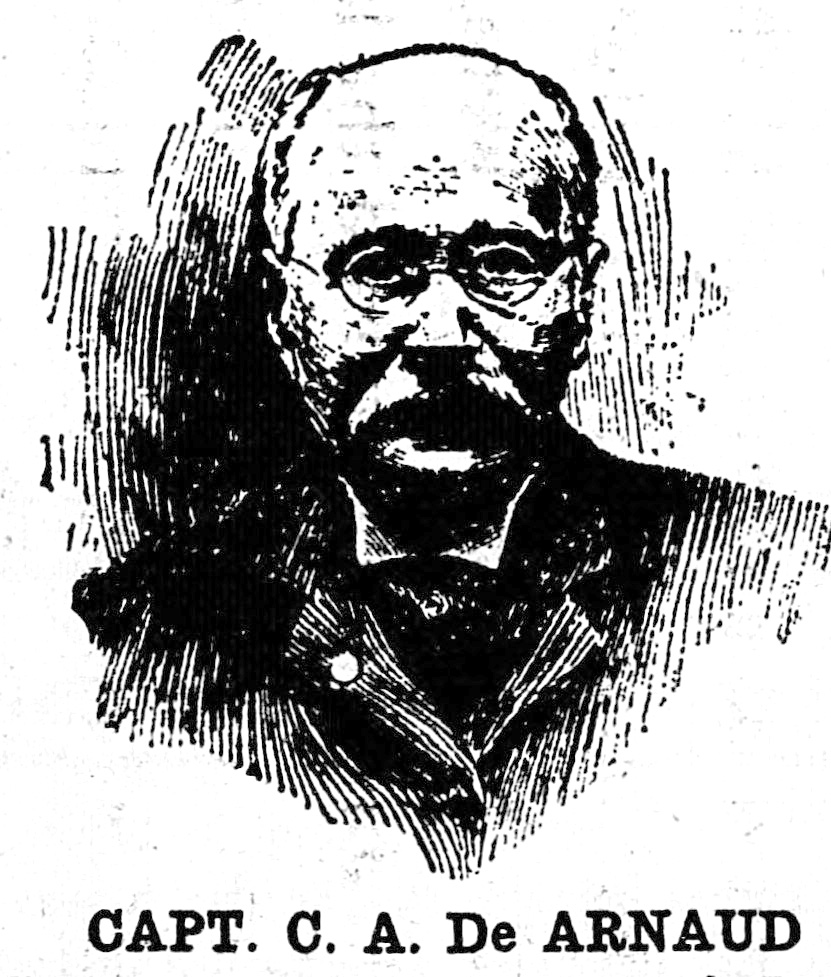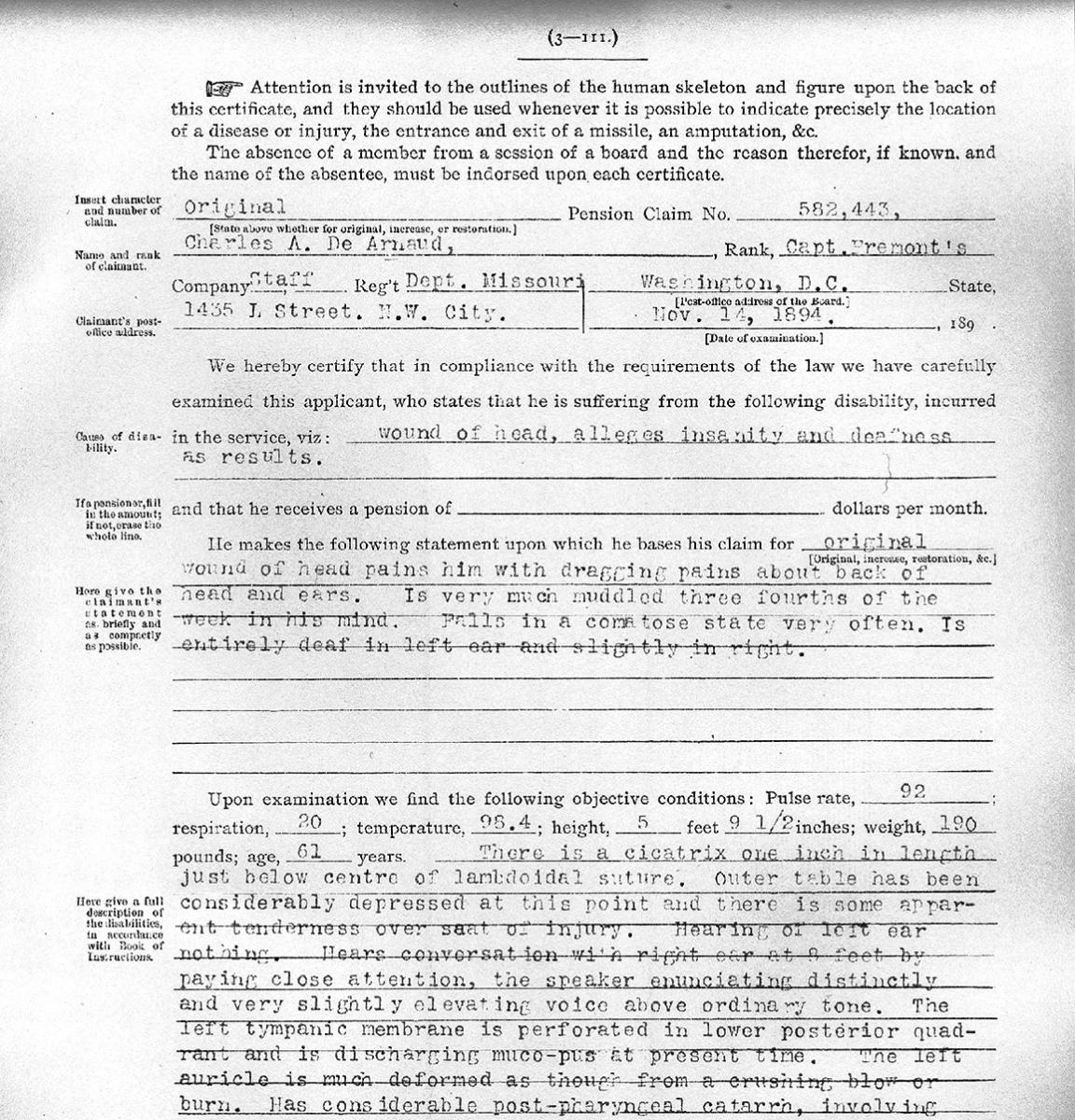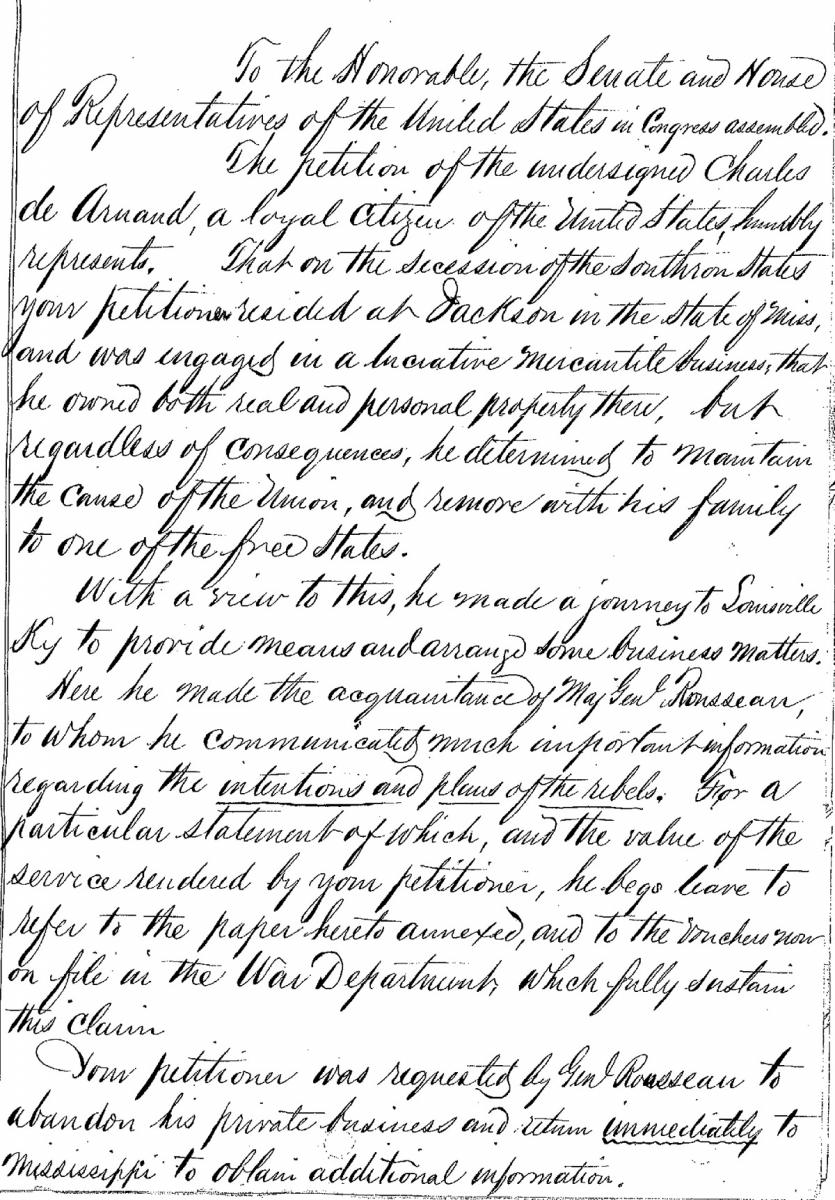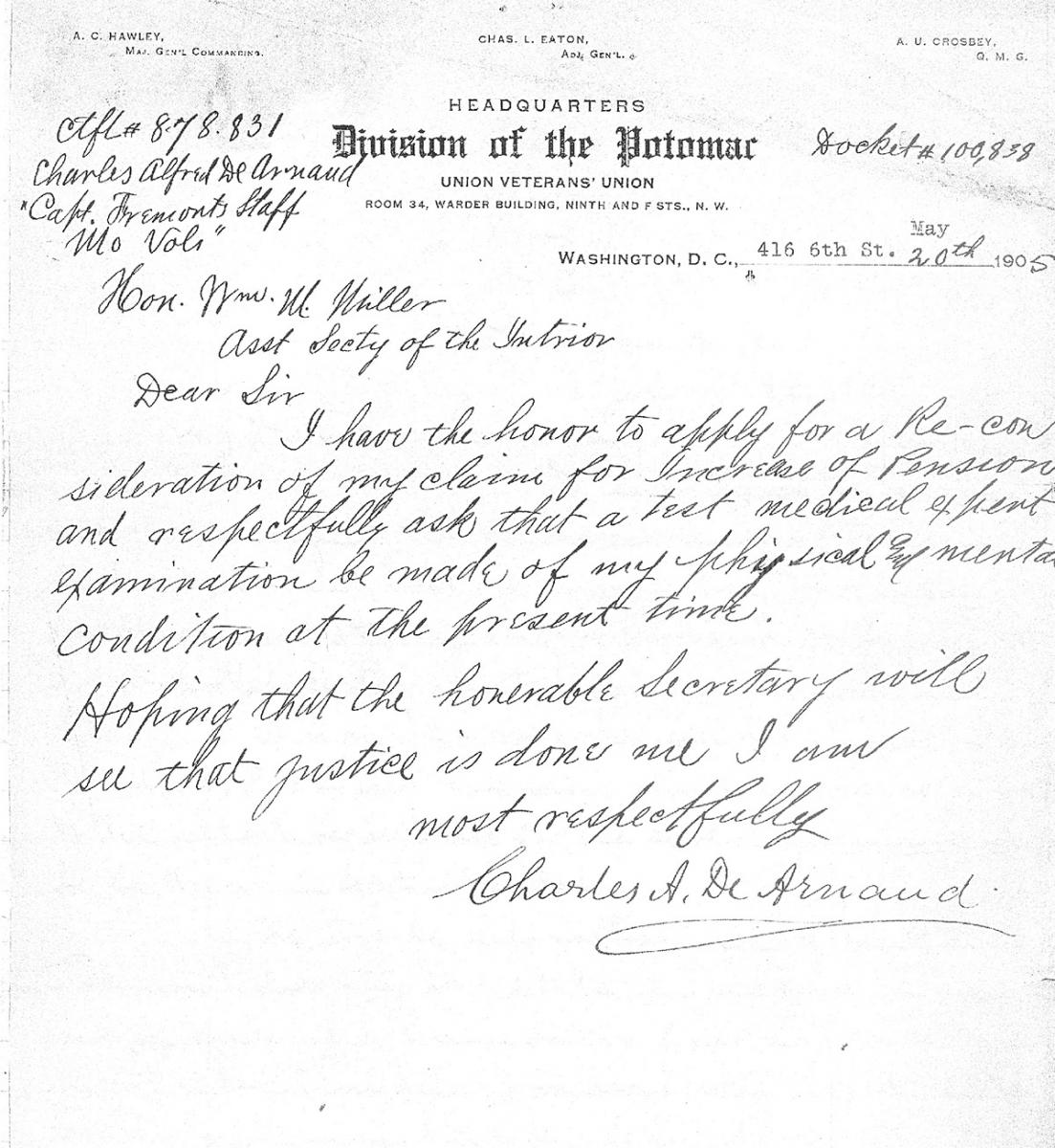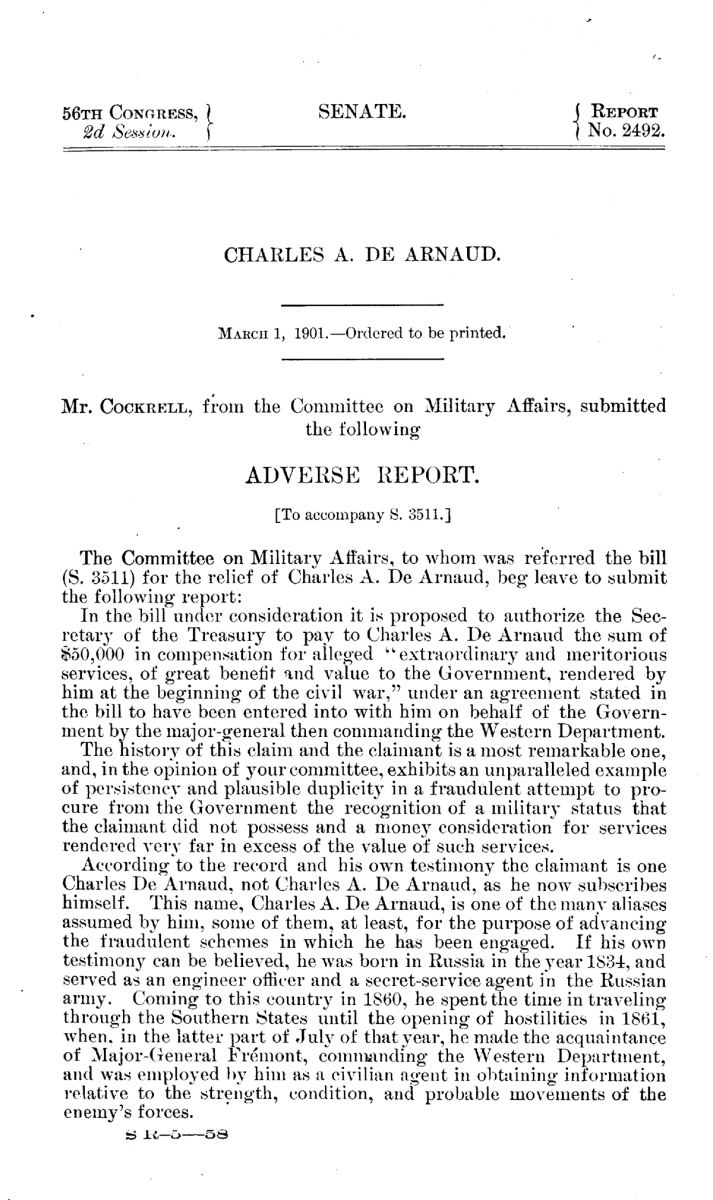
'An Imposter If There Ever Was One'
The Trials of Charles De Arnaud
Spring 2015, Vol. 47, No. 1
By James W. Harlow
Charles De Arnaud was the most infamous government claimant of the Gilded Age.
From 1885 until his death in late 1905, he sought a gold medal from Congress, a Medal of Honor, a veteran’s pension, and a $50,000 payment from the United States. He haunted the hallways of Congress and bedeviled federal bureaucrats. He did not spare the courts, including the United States Supreme Court, from his many pleas and requests.
These efforts brought De Arnaud great notoriety. The Washington Post declared that he was “known by almost every public man in the country.”
For as much as De Arnaud’s life played out publicly in newspapers, courtrooms, and official government documents, it remained mired in controversy and shrouded in mystery. To some, he was a gentleman-soldier who had served the United States at great personal cost and never received his full due. To others, he was an irrepressible fraudster who shamelessly pursued undeserved money and honors for decades.
The search for the elusive truth about De Arnaud begins amid the confusion and turmoil of the Civil War.
Signing On as a Spy for Gen. John Frémont
He never tired of telling the tale.
For 20 years, from the mid-1880s until his death, Charles De Arnaud regaled friends, newspapermen, and passersby with his exploits behind Confederate lines during the early days of the Civil War and his meetings with Abraham Lincoln and Ulysses S. Grant. In the summer of 1861, De Arnaud, who claimed to be a Russian military engineer, presented himself to Gen. John C. Frémont, commander of the Union Army in the west, and offered his services. Frémont accepted and directed him to correct inaccuracies in the Union Army’s maps and gather intelligence about Confederate plans. Crucially, De Arnaud later claimed to have carried out these duties as a Union Army officer, commissioned personally by Frémont.
In the summer and fall of 1861, De Arnaud repeatedly ventured behind Confederate lines. His most famous mission involved a dramatic escape from capture to warn General Grant about an impending Confederate attack. In his most self-serving postwar accounts, De Arnaud freely admitted that he had hesitated to even undertake the mission. Although he professed devotion to the Union cause, he became receptive only when Frémont mentioned the prospect of an astounding $50,000 payment (approximately $1.3 million today)—a rich enough reward to overcome the risk of capture.
With his eyes set on a fortune, De Arnaud headed south.
De Arnaud soon learned of a planned Confederate strike on Paducah, Kentucky, a key city at the confluence of the Ohio and Tennessee Rivers. But he was captured in Tennessee as he raced for the Union lines. De Arnaud was denounced as a spy to Confederate authorities and summarily condemned to death.
As he waited for the sentence to be carried out, a melee ensued, during which his accuser killed a Confederate officer and knocked De Arnaud unconscious. In the confusion, De Arnaud escaped from custody.
He traveled through the night until he reached Grant and warned the general of the impending Confederate attack. Based on De Arnaud’s report, Grant quickly moved his forces to Paducah and foiled Confederate plans. The capture of Paducah was an early laurel in Grant’s wartime record.
$50,000 Payment Promised, but the Paymaster Refuses
By November 1861, De Arnaud had endured “constant personal suffering,” as he later attested in his memoir, and could serve no more. When he sought to collect his for-tune, however, he discovered that the Army paymasters would pay him $600 and no more. Undeterred, he gathered testimonials of his service from prominent Union military leaders, including Frémont and Grant, and set out for Washington, D.C.
Upon his arrival in the capital, De Arnaud presented his claim to the War Department—and also directly to Abraham Lincoln. According to one observer, the President remarked that the nation owed De Arnaud “a debt of gratitude.” But Lincoln refused to authorize payment on the spot. The War Department balked at De Arnaud’s demands. De Arnaud grudgingly accepted $2,000 and signed a receipt to confirm that it constituted payment “in full” for his “services and expenses as [a] special agent.”
De Arnaud purportedly left the United States for Europe in February 1862. He did not return to public life in the United States for more than two decades.
In 1885 De Arnaud resurfaced in Washington and resumed his quest for payment. He engendered much public sympathy with his tale of heroic but under-rewarded service.
De Arnaud’s mien commended the truth of his account. About 50 years old, he claimed to be a Russian aristocrat and Crimean War veteran. He certainly looked the part of the noble warrior, tall with dark hair and a mustache to match. An aquiline nose protruded between his blue eyes. His erect bearing only amplified an aura of “a gentleman of education and of distinguished and aristocratic appearance.”
De Arnaud ensconced himself in Washington high society. He was known varyingly as “Captain De Arnaud,” “Colonel De Arnaud,” and “Count De Arnaud.” Reporters were drawn to his tale, and newspapers from coast-to-coast endorsed his claims. He married a wealthy widow many years his senior. He joined the Grand Army of the Republic, the influential organization of Union Army veterans. Eager to publicize his role in the Civil War, he published a book of his adventures and commented regularly on the war.
De Arnaud Begins His Pleas For a Veteran’s Pension
In August 1886, De Arnaud filed a claim for a veteran’s pension. The awarding of pensions to Union veterans was one of the federal government’s first large-scale benefits programs. Veterans’ pensions were considered gifts from a grateful nation bestowed for wartime sacrifice—not a legal right. The United States Pension Bureau, an undermanned agency within the Interior Department, administered the mammoth program.
De Arnaud’s 1886 application fell under the disability-based pension system. Claimants had to prove (1) their military service during the Civil War, (2) a disability incurred in the line of duty, and (3) that the disability was severe enough to qualify for a pension. In his application, De Arnaud stated that General Frémont commissioned him, under the alias Alfred Arnaud, as captain of Company F, Fifth Missouri Volunteers. He claimed disability from a head wound suffered during his escape from capture, and a leg wound suffered during another mission. In an 1890 Washington Post interview, he claimed that these wounds left him “totally disabled for life—utterly incapacitated for ordinary business pursuits.”
De Arnaud simultaneously sought a larger prize than a monthly pension. He petitioned a Senate committee for a private bill awarding him $50,000. He rejected an offer of $5,000, determined to receive the full amount. Shifting his efforts, he requested a $50,000 payment from the Treasury Department.
Yet after three years of maneuvering, he had little to show for his efforts by 1889. The Pension Bureau rejected his claim because the records indicated Capt. Alfred Arnaud was mustered out of the service in August 1861—before De Arnaud allegedly suffered the head and leg wounds. Wounds suffered after an enlistment expired, by law, were not incurred in the line of duty and not pensionable.
Congress Says ‘No’ to Medal; Insane for Two Decades?
A bill to award him a gold medal died in Congress despite confident predictions about its passage. And the Treasury Department referred his request for $50,000 to the United States court of claims. The government predictably fought the suit, so for the first time, De Arnaud’s tale was closely scrutinized.
Before the court of claims, De Arnaud sought to enforce an oral employment contract made with Frémont to perform special duties. Ironically, this theory contradicted his pension application that he had remained a serving Army officer through his wounding. If he had been a serving officer, the Army would not have separately hired him for services he was already duty-bound to perform. Inconsistencies and contradictions were a hallmark of De Arnaud’s proceedings—as was his dexterity in avoiding damaging admissions.
Of his many muddled issues, perhaps none was more vexing for De Arnaud to explain or his opponents to unravel than his whereabouts between 1862 and 1885.
De Arnaud now offered a startling explanation. He testified that, after returning to Europe, he went insane from his wounds. His insanity manifested through “the hallucination that [he] was being pursued by [his] enemies,” who sought to kill him. He confessed little firsthand recollection of the 20-year period besides traveling the world under assumed names and being institutionalized in European asylums. His faculties were restored only in 1885 when an abscess on his brain burst.
His insanity claim, however, was doubted from the outset.
The government produced a letter De Arnaud wrote to President Grant in June 1871 from Cincinnati. In it, De Arnaud recalled his wartime service and beseeched the President to relieve his dire financial straits. Upon confrontation, De Arnaud acknowledged the letter’s existence and contents yet professed ignorance about his mindset at the time of writing. He lamely mused that in 1871 he traveled from Europe to Cincinnati for a few days before hallucinations overcame him.
Another Alfred Arnaud And a Trial for Fraud
On May 3, 1890, an event occurred that would forever alter De Arnaud’s trajectory. An Arkansas physician named Alfred Arnaud filed his own claim for a veteran’s pension. The physician’s name and military service matched Charles De Arnaud’s, who had sworn to the Pension Bureau that he had served under the name Alfred Arnaud. The War Department records, however, contained only one entry for Alfred Arnaud. One of the Arnauds making a claim was an imposter.
In early July 1890, Commissioner of Pensions Green B. Raum dispatched an investigator to Arkansas. The Pension Bureau investigator interviewed the physician Arnaud and left convinced of Dr. Arnaud’s veracity—and De Arnaud’s duplicity.
In August 1890, a federal grand jury in the District of Columbia indicted De Arnaud for knowingly presenting a false pension claim. News of De Arnaud’s indictment and arrest spread across the country. In the Washington Post, De Arnaud urged the public’s forbearance and insisted “[t]he indictment is based upon a mistake.” He lamented that instead of being rewarded, “[h]ere in your Republic you try to make me a felon.”
On January 23, 1891, a newspaper correspondent recorded that a “stout, elderly, well-dressed gentleman, with a dark mustache, and wearing gold-rimmed spectacles” appeared in Washington’s criminal court. The federal prosecution of De Arnaud for pension fraud had commenced.
The prosecutor’s argument was straightforward. Dr. Arnaud’s statements of military service (which De Arnaud stipulated were accurate) and the absence of any other Arnaud in the War Department’s records demonstrated the falsity of De Arnaud’s sworn pension claim.
De Arnaud defended himself as a victim of bureaucratic negligence. Somehow the War Department’s official records failed to include his own Army commission, for which he could hardly be blamed. In the trial’s climax, De Arnaud took the stand and stalwartly maintained his account, fending off a relatively ineffectual cross-examination.
The jury reached its verdict the following day: not guilty. De Arnaud immediately thanked the jury, and as his supporters cheered, he walked free.
Another $50,000 Rejection, Another Plea to Congress
Unbeknownst to De Arnaud at the time, the Pension Bureau immediately neutralized the jury’s verdict. Commissioner Raum readjudicated De Arnaud’s claim and determined that his military service was not established and he remained ineligible for a pension.
Worse yet for De Arnaud’s financial prospects, in mid-1891, the court of claims decided in favor of the government and refused to award him $50,000. The court accepted fully De Arnaud’s account and felt he “deserves the good will of the country.” However, De Arnaud’s services were of a secret nature and Supreme Court precedent barred litigation of espionage contracts in the federal courts. Congress alone, the court said, could grant him relief. De Arnaud turned to Congress but not as the court anticipated.
As 1892 opened, Charles De Arnaud’s prospects seemed bleak. But like many throughout Washington’s history, De Arnaud sought redemption in a political struggle.
By the 1890s, veterans’ pensions had emerged as a flashpoint in the political struggle between Republicans and Democrats. Eager to attract veterans’ electoral support, Republican Congresses methodically expanded pension eligibility and made the payments more generous. Hundreds of thousands joined the pension rolls. Many Democrats criticized the metastasizing pension scheme as unmanageable, financially irresponsible, and morally ambiguous.
In May 1892, De Arnaud testified before the congressional committee investigating the Pension Bureau under Commissioner Raum, a Republican appointee. De Arnaud blamed his prosecution, which Raum authorized, on a vendetta by the commissioner against him. The committee pored over De Arnaud’s pension file. Raum testified and denied the charges of malicious prosecution.
De Arnaud’s appearance before Congress rejuvenated his cause.
In its report to the House of Representatives, the committee’s Democratic majority condemned his prosecution as “a gross outrage” and endorsed fully his pension claim. The committee’s Republicans defended the Pension Bureau’s actions while conceding De Arnaud’s apparent entitlement to a pension. In the press, too, De Arnaud’s reputation was reborn. The New York World derided Raum for the “malignant persecution” of De Arnaud, “a brave and singularly intelligent officer.”
High Court Deals Setback; A Return to Pension Bureau
In January 1894, the U.S. Supreme Court delivered another setback, affirming dismissal of the Court of Claims suit albeit on different grounds. The dispositive issue was not whether De Arnaud and Frémont entered into a contract for espionage services; rather it was whether De Arnaud had already accepted payment in full.
Department in January 1862 and freely signed a receipt to that effect. In any event, the court noted, De Arnaud had filed his case many years after the deadline to do so had passed.
De Arnaud pivoted back to the Pension Bureau and requested another readjudication of his claim. William Lochren, the new commissioner of pensions, declined to modify the Pension Bureau’s position. However, in October 1894, Assistant Secretary of the Interior John M. Reynolds unexpectedly overruled Commissioner Lochren’s decision and remanded the case. Reynolds based the remand on a narrow procedural ground and did not intend to reach the merits of the claim.
Reynolds’s ruling proved so technical as to be confusing. The day after Reynolds remanded the claim, newspaper headlines nationwide blared that the government had awarded De Arnaud a pension. Commissioner Lochren also apparently believed himself ordered to admit the claim in its entirety. On November 23, 1894, Charles De Arnaud received a pension at the rate of $10 a month for a “wound of head.” Remarkably and likely mistakenly, De Arnaud had his pension.
Insanity Plea Is Little Help; Pension Bureau Still Says ‘No’
After nearly a decade of struggle, Charles De Arnaud might have accepted vindication and receded from the limelight. Of course, he did nothing of the sort. De Arnaud immediately requested a larger pension for his period of insanity. Commissioner Lochren ordered Special Examiner A. H. Thompson to investigate.
Special Examiner Thompson’s inquiry was exhaustive. He interviewed numerous witnesses, including the capital’s press corps, and heard that “the words ‘general crank’ is the universal description given of the man.” Thompson even deposed De Arnaud. Thompson was impressed by his “rare intelligence.” Nonetheless, De Arnaud dissembled when the questions became uncomfortable.
An exasperated Thompson reported, “The claimant has made so many statements before the various courts and in his pension claim that it is impossible to secure an explanation of his varied contradictions. When he cannot explain, he reverts to his long period of unconsciousness, and he says he does not know.” Commissioner Lochren declined to increase De Arnaud’s pension.
De Arnaud appealed the ruling, and in July 1896, Assistant Secretary Reynolds again took up his case. Reynolds admitted that this case, “without parallel” amidst the hundreds of thousands of pension claims, gave him “a most unusual sense of responsibility.”
The assistant secretary controversially reversed the Pension Bureau’s long-held position and found that 30-year-old testimonials from General Frémont and others established that De Arnaud had served as a Union officer despite no corroborating War Department record. But if Reynolds was willing to accept circumstantial evidence from military heroes, he was not persuaded by the word of De Arnaud.
Reynolds caustically attributed De Arnaud’s insanity in January 1862 to “his want of money.” Reynolds highlighted the absence of testimony from De Arnaud’s relatives, who supposedly supervised his 20-year institutionalization. Insanity was a bridge too far for Reynolds, and he affirmed the denial of De Arnaud’s pension increase.
De Arnaud eventually addressed Reynolds’s challenge about the lack of evidence from his family members. Out of the blue, De Arnaud submitted an affidavit from Maximilian Schmiedeberg, an unspecified “relative,” which corroborated entirely the insanity story. The Pension Bureau rejected the affidavit for the concoction that it almost certainly was. The effort only served to convince the Pension Bureau of the need to remain vigilant against De Arnaud.
Medal of Honor Rejected; Pension Increase Denied
Meanwhile, Col. Fred Ainsworth, head of the War Department’s records office, issued a scathing report after De Arnaud requested a Medal of Honor. Ainsworth marveled that “[a]fter disclosures had been made about him that would have driven an ordinary mortal into seclusion for the remainder of his life, he again came to the front, cheerful and unabashed, with a tale of persecution, vindictiveness, and abuse to account for all the ills that had befallen him.” Ainsworth rejected the notion that De Arnaud had ever worn a Union officer’s uniform. His report concluded with a flourish:
"[I]t does not seem possible that even the most credulous can be imposed upon or misled by De Arnaud’s transparent and childish fictions, or can be induced to believe that he was ever anything more than a plain, ordinary, unromantic, civilian spy, or that while so employed he was ever injured in the way that he now claims to have been."
The application for a Medal of Honor was rejected.
By the turn of the 20th century, relations between De Arnaud and the Pension Bureau deteriorated dramatically. The new commissioner of pensions, H. Clay Evans, drew upon his predecessors’ exasperation and declared that De Arnaud was “an impostor if there ever was one who applied for a pension.” Not even a request from Attorney General John W. Griggs, who believed De Arnaud “entirely honest, although somewhat eccentric,” swayed Secretary of the Interior
He Still Wants the $50,000, Heads to Capitol Hill
He focused his attention on the body of government that seemed most receptive to his plight—Congress. In 1901, a Senate bill was introduced to award De Arnaud $50,000. An adverse Senate committee report, however, rejected this “unparalleled example of persistency and plausible duplicity in a fraudulent attempt to procure from the Government the recognition of a military status that the claimant did not possess and a money consideration for services rendered very far in excess of the value of such services.” Successive Congresses also declined to grant his pleas for more modest increases to his monthly pension.
By autumn 1902, De Arnaud was in dire straits. His wife had died, and her fortune had evaporated. De Arnaud’s social capital also was depleted. The Washington Times reported that he “found that his best friends were turning against him, the doors of formerly hospitable homes shut in his face, his private business affairs seriously affected, and that he was reduced to penury.”
De Arnaud cast about for someone to blame for his misfortunes. He found the culprit in now-General Ainsworth, who op-posed his Medal of Honor application, and sued Ainsworth for libel. The suit quickly foundered because Ainsworth’s comments were made in the course of his official duties, rendering them immune from suit.
On December 28, 1905, Charles De Arnaud died at the age of 70. His death certificate identified the immediate cause of death as “exhaustion”—fitting for a man regarded as the most persistent government claimant of his age. In the final act of this odyssey, the Pension Bureau noted his death and removed him from the pension rolls.
Charles De Arnaud: Officer, Spy or Traitor?
Was Charles De Arnaud a hero or a fraud? After all, De Arnaud had notable backers, and several modern scholars have repeated his account as true. Nevertheless, close scrutiny leads inexorably to the conclusion that Charles De Arnaud was a remarkable fraudster.
No reliable evidence exists to support De Arnaud’s claim that he was a Union officer. Neither the sparse testimony of General Frémont, who belatedly endorsed De Arnaud’s account two decades after the war, nor that of De Arnaud, a pervasive dissembler, can be credited. No wartime record authored by or written to De Arnaud in 1861 and early 1862 referred to him as anything but a civilian.
Newly unearthed evidence that remarkably escaped the Pension Bureau’s attention further establishes the falsity of De Arnaud’s claim. In 1863, De Arnaud submitted a request to the War Department for compensation and attached a detailed account of his service. Nowhere does De Arnaud mention serving as a Union Army officer.
In June 1864, after being rebuffed by the War Department, De Arnaud petitioned Congress for compensation and again described his exploits as a spy without reference to military service. Thus, by his own contemporary accounts, De Arnaud was nothing more than a civilian spy and not eligible for a veteran’s pension.
Perhaps inherent to the character of a spy and certainly inherent to the character of a fraudster, De Arnaud’s tale of wartime service was embellished and his information inaccurate. De Arnaud’s 1863 and 1864 petitions make no mention of a dramatic escape from Confederate hands after being sentenced to death. Subsequent historical analysis also discredits his famous report to Grant about an impending Confederate attack on Paducah, Kentucky.
So too does De Arnaud’s claim of being institutionalized in Europe from 1862 to the 1880s become unhinged. Besides the 1871 letter to President Grant, he signed and submitted the 1863 and 1864 petitions, which were lucid and detailed, in Washington, D.C. He also witnessed and signed in 1863 another soldier’s pension application. De Arnaud’s fellow witness to that 1863 pension application was Max Schmiedeberg, who reappeared 30 years later as De Arnaud’s mysterious “relative.”
Driven by financial desperation and aided by a penchant for duplicity, De Arnaud even apparently became a Confederate agent. In October 1863, a letter from Confederate Secretary of State Judah Benjamin intended for De Arnaud, and accompanied by funds to bribe foreign-born Union officers, was mistakenly delivered to another Washington resident, who informed Federal authorities. Fortunately for De Arnaud, the authorities took no immediate action, and the incident was forgotten by the time he reemerged in the public arena.
History’s verdict provides no comfort to Charles De Arnaud.
James W. Harlow is a trial attorney with the U.S. Department of Justice. He is a graduate of Duke University School of Law and Johns Hopkins University. His previous publications have appeared in the Duke Law Journal and other law reviews. In a personal capacity, he has researched the Pension Bureau’s efforts to combat fraud for several years. The opinions expressed herein are solely the author’s and do not represent the views of any other entity, including the Department of Justice.
Note on Sources
Many of this article’s key sources are located in the collections of the National Archives in Washington, D.C. Record Group 15 contains Charles De Arnaud’s hefty, seven-folder pension file, which includes information from the Pension Bureau, War Department, Congress and the federal courts, as well as the pension file of John Schanfield, a/k/a Julius Schoenfeld, the 1863 application witnessed by De Arnaud. An 1862 physical description of De Arnaud can be found in his passport application in the State Department’s records (Passport Applications, 1795–1905, National Archives Microfilm Publication M1372, roll 102, General Records of the Department of State, Record Group [RG] 59). Files from his criminal prosecution are located in the criminal case files of the Supreme Court of the District of Columbia, Records of District Courts of the United States, RG 21. De Arnaud’s recently unearthed 1863 and 1864 petitions were contained in the records of the Senate Committee on Claims, Records of the United States Senate, RG 46.
De Arnaud’s numerous petitions and appearances before Congress resulted in several reports containing valuable evidence, including House Report No. 49-4171 (1887), House Report No. 52-1868 (1892), Senate Report No. 56-2492 (1901), and Senate Report No. 58-3047 (1905). Senate Report No. 56-2492 also reproduced Col. Fred C. Ainsworth’s report on De Arnaud’s Medal of Honor application.
Federal court opinions related to De Arnaud are De Arnaud v. United States, 26 Ct. Cl. 370 (1891), De Arnaud v. United States, 151 U.S. 483 (1894), and De Arnaud v. Ainsworth, 24 App. D.C. 167 (1904).
De Arnaud himself was a prolific writer. He published a book recounting his Civil War service, The Union, and Its Ally, Russia (Washington: Gibson Bros., 1890), and wrote numerous letters to the editor discussing the war.
De Arnaud also was the subject of many newspaper articles around the country. Besides the archives of major newspapers like the Washington Post, the Library of Congress’s Chronicling America historical newspaper database contains invaluable articles about De Arnaud.
The District of Columbia Archives possesses De Arnaud’s death certificate, which identifies his cause of death.
William H. Glasson’s Federal Military Pensions in the United States (1918) contains a detailed description of the Civil War–era veterans’ pension scheme. The modern historical debunking of De Arnaud’s warning about an imminent Confederate attack on Paducah is contained, among other places, in William B. Feis’s Grant’s Secret Service: The Intelligence War from Belmont to Appomattox (2002). The information about De Arnaud as a potential Confederate agent was published in The Salmon P. Chase Papers: Journals, 1829–1872, vol. 1, ed. John Niven (Kent, OH: Kent State University Press, 1993).
